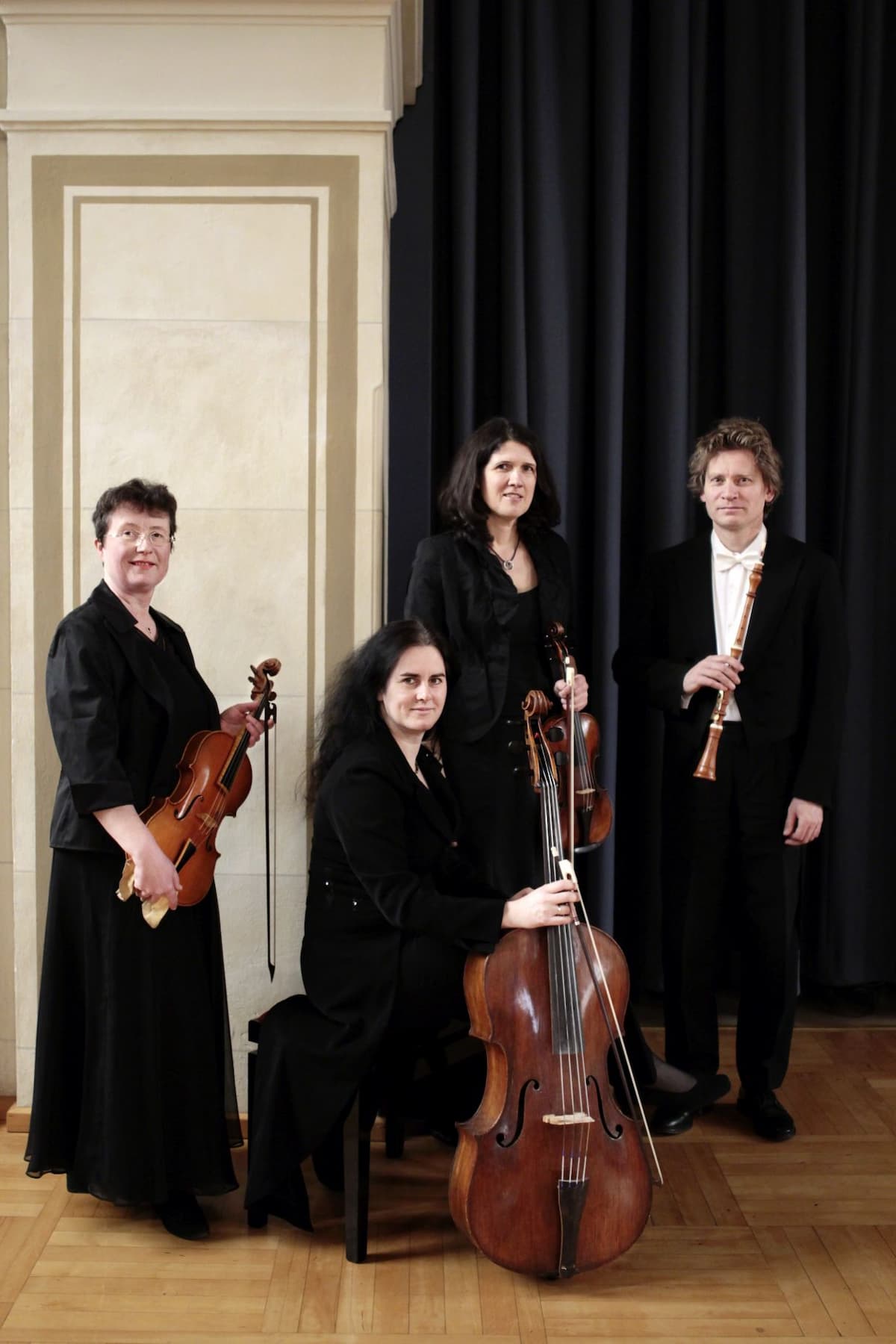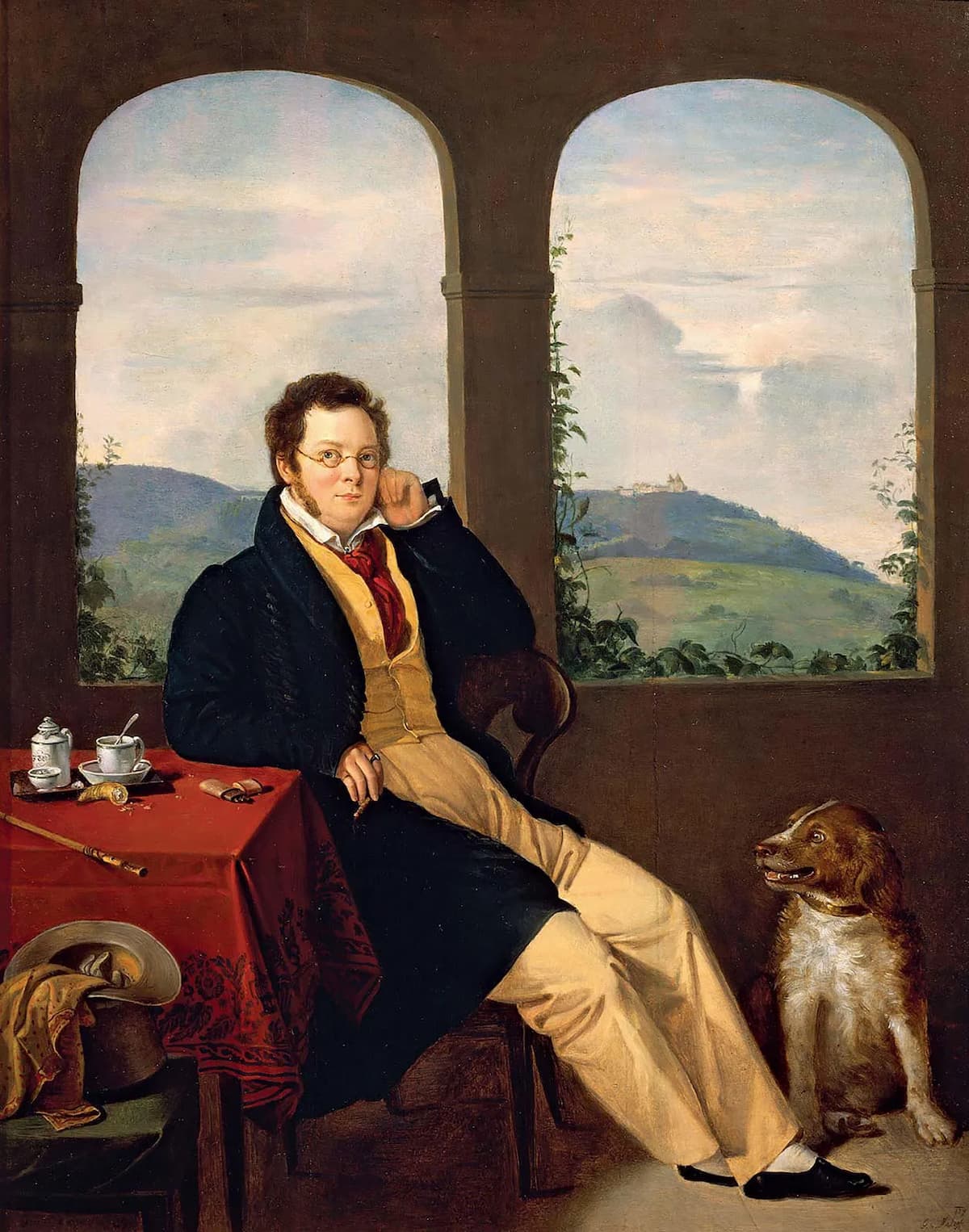Schubert’s song cycle Winterreise has none of the bright optimism of his earlier Die schöne Müllerin. The spring day of ‘Das Wandern’ is now the cold frozen dusk of ‘Gute Nacht’. Our hero starts off isolated, leaving town in the cold of winter after having been disappointed in love: ‘The girl spoke of love, | Her mother even of marriage’ but now he can only write ‘good night’ on her gate and depart down the road.
In a new arrangement of the song cycle, traditionally performed by voice and piano, the instrumental part here is taken over by the English horn and string trio (violin, viola, and cello) of the Grundmann Quartet. It’s a remarkable transformation in sound. We suddenly have the wind of the winter and its piercing cold. The ice that sparkles in the air and the coldness of our feet all come through.

The Grundmann Quartet
In the first song, where our unnamed hero is leaving, the English horn establishes the mood and the strings convey the restlessness in the poetry – ‘I arrived a stranger, | A stranger I depart’. No longer welcomed, his only companion is the moon as he makes his way across the meadows and forests around the town.
Franz Schubert: Winterreise, Op. 89, D. 911 – No. 1. Gute Nacht (Florian Götz, baritone; Grundmann Quartet)
His frozen tears drop, set into motion by the strings. Yet the piece has a warm feeling, because, as he says, the tears are coming up from his blazing heart before solidifying in the winter air.
Franz Schubert: Winterreise, Op. 89, D. 911 – No. 3. Gefror’ne Tränen (Florian Götz, baritone; Grundmann Quartet)
In one of the better-known songs from the cycle, ‘Der Lindenbaum’ (The Linden Tree), we start in his ‘sweet dream’ until reality in the form of a ‘cold wind’ intrudes, foreshadowed between the verses with a shiver of strings.
Franz Schubert: Winterreise, Op. 89, D. 911 – No. 5. Der Lindenbaum (Florian Götz, baritone; Grundmann Quartet)

Gábor Melegh: Franz Schubert, 1827 (Hungarian National Gallery, Budapest)
Taking refuge on the road in a charcoal burner’s cottage, he cannot rest – it’s been too cold to stand still, the wind has been blowing him onwards, and now, at rest, his mind and heart can only keep racing. The English horn seems to function as the memories that haunt him.
Franz Schubert: Winterreise, Op. 89, D. 911 – No. 10. Rast (Florian Götz, baritone; Grundmann Quartet)
Thinking he’d set the entirety of Wilhelm Müller’s cycle, Schubert stopped at 12 songs, only to discover another 12 poems in the cycle. He finished Part I in February 1827 and Part II in October of that same year.
Part II opens with ‘Die Post’ where the posthorn sounds from the passing mail coach, but there’s no letter from the sweetheart he left behind. Again, the English horn catches the right tone here.
Franz Schubert: Winterreise, Op. 89, D. 911 – No. 13. Die Post (Florian Götz, baritone; Grundmann Quartet)
Our wanderer continues on, seeing himself as the last leaf left on a wind-blown tree, as the outsider in a sleeping village where the people sleep and dream of ‘many a thing they do not possess’, caught in a winter storm, following the hidden paths empty of other travelers, misreading holiday wreaths as green funeral wreaths, before closing with ‘Der Leiermann’ (The Hurdy-Gurdy Player).
Franz Schubert: Winterreise, Op. 89, D. 911 – No. 24. Der Leiermann (Florian Götz, baritone; Grundmann Quartet)
One writer termed the overall theme of the cycle as ‘Restless, and yet seeking rest’. In his life’s journey, the wanderer seeks warmth and security, and yet, from the very beginning, he’s on a cold road to his future. The promises of settled happiness in his past memories still hold him captive, even though his reality is from being either happy or settled.
By changing the piano for the more emotionally evocative English horn and string trio, the arranger and English horn player Eduard Wesly is able to bring out the essential melancholy and loneliness of our unnamed wanderer in a new way. One writer sees Müller’s poetry as reflecting the disappointment of not just a lost lover but of the lost political hopes of the day. The poetry cycle was written in 1821 and 1822 while Europe was in the middle of a number of revolutions: in 1812 and 1813 the Russians and then the Prussians were fighting Napoleon, in 1821 the Greeks were fighting the Turks, and ahead lay the 1848 revolutions that would spread across all of Europe from Palermo to Paris to Transylvania. As industrialization was taking over the world, what was left were people like our wanderer or the hurdy-gurdy player, trudging in the cold from place to place. In this new arrangement of Schubert’s cycle, we can join them in that cold, bleak landscape.
For more of the best in classical music, sign up for our E-Newsletter



